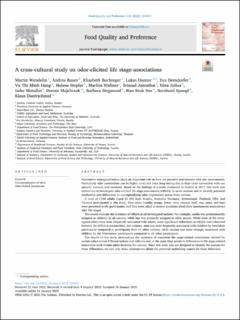Bitte benutzen Sie diese Kennung, um auf die Ressource zu verweisen:
https://doi.org/10.21256/zhaw-28808| Publikationstyp: | Beitrag in wissenschaftlicher Zeitschrift |
| Art der Begutachtung: | Peer review (Publikation) |
| Titel: | A cross-cultural study on odor-elicited life stage-associations |
| Autor/-in: | Wendelin, Martin Bauer, Andrea Buchinger, Elisabeth Danner, Lukas Derndorfer, Eva Thi Minh Hang, Vu Hopfer, Helene Wallner, Marlies Jantathai, Srinual Julius, Nina Matullat, Imke Majchrzak, Dorota Siegmund, Barbara Seo, Han-Seok Spangl, Bernhard Duerrschmid, Klaus |
| et. al: | Yes |
| DOI: | 10.1016/j.foodqual.2023.104810 10.21256/zhaw-28808 |
| Erschienen in: | Food Quality and Preference |
| Band(Heft): | 106 |
| Heft: | 104810 |
| Erscheinungsdatum: | 2023 |
| Verlag / Hrsg. Institution: | Elsevier |
| ISSN: | 0950-3293 1873-6343 |
| Sprache: | Englisch |
| Schlagwörter: | Conceptualisation of odor; Odor-elicited association; Österreich; Australien; Deutschland; Schweiz; Thailand; USA; Vietnam; Interkulturalität; Assoziation; Geruch |
| Fachgebiet (DDC): | 150: Psychologie |
| Zusammenfassung: | Associative conceptualization plays an important role in how we perceive and interact with our environment. Particularly odor associations can be highly vivid and often long-lasting due to their close connection with our episodic memory and emotions. Based on the findings of a study conducted in Austria in 2017, this work was carried out to investigate odor-elicited life stage-associations (OELSA) in seven nations and to identify potential similarities and differences in conceptualizing odor impressions across these nations. A total of 1144 adults (aged 21–60) from Austria, Australia, Germany, Switzerland, Thailand, USA, and Vietnam participated in this study. Nine odors (vanilla, orange, lemon, mint, coconut, basil, rose, anise, and hay) were presented to the participants, and they were asked to answer questions about their spontaneous associations with life stages. The results indicate the existence of OELSA in all investigated nations. For example, vanilla was predominantly assigned to children in all nations, while hay was primarily assigned to elder people. While most of the investigated odors were most frequently associated with adults, some significant differences in OELSA were observed between the different nationalities. For instance, mint was more frequently associated with children by Australian participants compared to participants from all other nations, while coconut was more strongly associated with children by the Vietnamese participants compared to all other participants. The results of this study demonstrate the existence of consistent life stage-related associations elicited by certain odors across different nations and cultures and, at the same time points to differences in life stage-related association with certain odors between the nations. Since this work was not designed to identify the reasons for these differences, we can only make assumptions about the potential underlying causes for these behaviors. |
| URI: | https://digitalcollection.zhaw.ch/handle/11475/28808 |
| Volltext Version: | Publizierte Version |
| Lizenz (gemäss Verlagsvertrag): | CC BY 4.0: Namensnennung 4.0 International |
| Departement: | Life Sciences und Facility Management |
| Organisationseinheit: | Institut für Lebensmittel- und Getränkeinnovation (ILGI) |
| Enthalten in den Sammlungen: | Publikationen Life Sciences und Facility Management |
Dateien zu dieser Ressource:
| Datei | Beschreibung | Größe | Format | |
|---|---|---|---|---|
| 2023_Wendelin-etal_A-cross-cultural-study-on-odor-elicited-life-stage-associations_foodqual.pdf | 4.85 MB | Adobe PDF |  Öffnen/Anzeigen |
Zur Langanzeige
Wendelin, M., Bauer, A., Buchinger, E., Danner, L., Derndorfer, E., Thi Minh Hang, V., Hopfer, H., Wallner, M., Jantathai, S., Julius, N., Matullat, I., Majchrzak, D., Siegmund, B., Seo, H.-S., Spangl, B., & Duerrschmid, K. (2023). A cross-cultural study on odor-elicited life stage-associations. Food Quality and Preference, 106(104810). https://doi.org/10.1016/j.foodqual.2023.104810
Wendelin, M. et al. (2023) ‘A cross-cultural study on odor-elicited life stage-associations’, Food Quality and Preference, 106(104810). Available at: https://doi.org/10.1016/j.foodqual.2023.104810.
M. Wendelin et al., “A cross-cultural study on odor-elicited life stage-associations,” Food Quality and Preference, vol. 106, no. 104810, 2023, doi: 10.1016/j.foodqual.2023.104810.
WENDELIN, Martin, Andrea BAUER, Elisabeth BUCHINGER, Lukas DANNER, Eva DERNDORFER, Vu THI MINH HANG, Helene HOPFER, Marlies WALLNER, Srinual JANTATHAI, Nina JULIUS, Imke MATULLAT, Dorota MAJCHRZAK, Barbara SIEGMUND, Han-Seok SEO, Bernhard SPANGL und Klaus DUERRSCHMID, 2023. A cross-cultural study on odor-elicited life stage-associations. Food Quality and Preference. 2023. Bd. 106, Nr. 104810. DOI 10.1016/j.foodqual.2023.104810
Wendelin, Martin, Andrea Bauer, Elisabeth Buchinger, Lukas Danner, Eva Derndorfer, Vu Thi Minh Hang, Helene Hopfer, et al. 2023. “A Cross-Cultural Study on Odor-Elicited Life Stage-Associations.” Food Quality and Preference 106 (104810). https://doi.org/10.1016/j.foodqual.2023.104810.
Wendelin, Martin, et al. “A Cross-Cultural Study on Odor-Elicited Life Stage-Associations.” Food Quality and Preference, vol. 106, no. 104810, 2023, https://doi.org/10.1016/j.foodqual.2023.104810.
Alle Ressourcen in diesem Repository sind urheberrechtlich geschützt, soweit nicht anderweitig angezeigt.